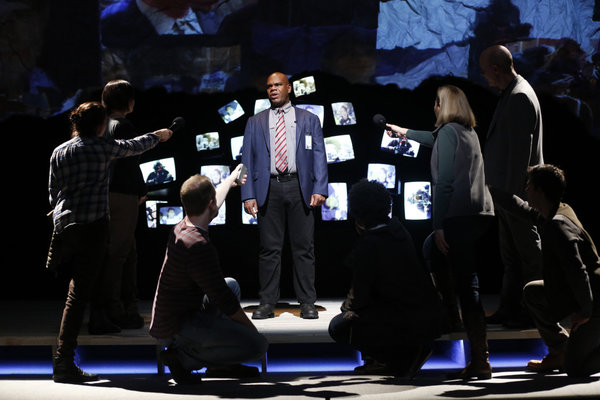A ring of chairs encircles a man holding a sign printed with the words, “Matt in Hell,” over a photo of a young man’s face.
The man is Fred Phelps, the head of the Westboro Baptist Church, who is protesting at the funeral of Matthew Shepard, who was murdered in Laramie, Wyo. in 1998. Friends of the victim dress as angels and silently stand around Phelps, blocking funeral-goers from his venomous words.
This scene from “The Laramie Project,” running now through Oct. 27 as a part of The Lincoln Legacy Project, jumps back to 1998, to the events immediately following the brutal beating and murder of Shepard, a young gay man studying at the University of Wyoming.
The two-and-a-half hour show has the eight cast members playing multiple roles, quickly changing small parts of their costumes, mannerisms and voices to distinguish from one character to the next.
“I have eight or nine characters. But, when you really break it down, each of us has at least one or two characters that are really developed throughout the show,” Paul Scanlan, a cast member, said. “All of us play these little sound bite characters, but then we all have these characters that really take a journey throughout the show.”
A college student is denoted by the simple addition of a backwards baseball cap, while a sheriff’s costume is distinct due simply to his jacket. When each character speaks, you feel as if he is simply speaking directly to you, not as if he is playing a part on stage.
This intimacy resonated with the audience, as members cried during a scene where Matthew’s father, Dennis Shepard, spoke directly to one of his son’s murderers in court and requested that the jury not sentence him to the death penalty.
Cast member Kimberly Gilbert said she wished tragic events like those that transpired in Laramie were no longer an issue in our world.
“The tragedy is that we still need this show. I wish this could be a period piece, but it’s not,” said Gilbert. The Tectonic Theatre Project, who wrote “Laramie,” “went back to Wyoming and there are university students there right now who have no idea who Mathew Shepard is, who have no idea what the story is about.”
Gilbert hopes that people do not forget Matthew’s story.
“It’s the human desire to sweep it under the rug, like it never happened, and move on. Doing this play again is saying, no, we have to remember.”
This month, on the 15th anniversary of his death, the production encourages audience members to contemplate and attempt to understand, as one character poignantly states, “the magnitude with which some people hate.”
The play has been coupled with a series of events meant to honor Shepard’s memory, including a candlelight vigil and a free exhibition, “Not Alone: The Power of Response,” featuring personal letters sent to the Shepard family after Matthew’s death.
Matthew’s mother, Judy Shepard, recently attended a production in honor of her son and sat on a discussion panel after the show, speaking with audience members about the tragedy. Her appearance was the first in a special Monday night discussion series set to run the length of the production.
Due to the the government shutdown, “The Laramie Project” will not take place in Ford’s Theatre as originally scheduled, as it is a National Historic Site, moving Tuesday’s performance to Woolly Mammoth Theatre. The series will continue Oct. 4 and Oct. 8 at First Congregational United Church of Christ. Tickets for these showings are free of cost and will be distributed on a first-come basis.






